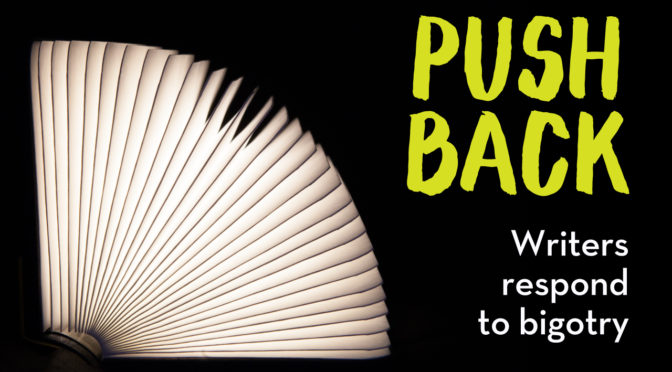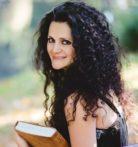Someone Else’s Shoes

Recently we have seen a renewed increase in bigotry, fear and Islamophobia in Australia, across the political sphere and the media, and among some leading political and social commentators.
We believe there are more powerful views in our community – of solidarity, inclusivity and empowerment.
In our new series, Pushback: Writers Respond To Bigotry, the Stella Schools blog is offering an alternative platform for contributions from constructive and positive voices. A series of guest writers will address topics related to culture, gender, diversity and representation.
In our second post, Demet Divaroren argues that storytelling is an exploration of what makes us human, and that words have the capacity to shatter stereotypes.
Someone Else’s Shoes
My mother-in-law went into labour the night before I was born. She lived on the third floor of a small apartment block in the outskirts of Paris. When her contractions started, she walked down a winding staircase and sat on a stone bench in the backyard to wait for the ambulance. My husband was born at 9pm, and by 11pm, my father-in-law had sent a telegram to India and Pakistan to announce his arrival. Approximately 2940 kilometres away, in a village in Adana, Turkey, my fifteen-year-old mum was roasting chestnuts on a clay heater in her childhood home when her waters broke. Mum still had the grainy sweet taste of chestnuts in her mouth when she delivered me into the hands of a local midwife in the early hours of the morning.
My husband and I were infants when we migrated to Australia with our families in the early ’80s. His childhood was lit up with Christmas lights, while mine was sweetened with Turkish delight at Ramazan Bayram (the Festival of Sweets that follows the month of fasting) and Kurban Bayram (the Festival of Sacrifice, when a sheep or a cow is sacrificed and distributed to the poor). We respectively grew up on traditional Indian–Pakistani and Turkish dishes that stunk out our school bags. My husband ate ox tongue sandwiches at lunch, and I grazed on stuffed vine leaves. Our palates punctuated our differences to the world around us like exclamation marks.
When our worlds collided at university, it was our similarities that built the foundation of our friendship. We stacked each one like bricks and, thirteen years later, we fell in love and were married by a celebrant in the Royal Botanic Gardens. We help the poor at Kurban Bayram; we pop bonbons at Christmas; we eat Turkish stews, Indian curries and throw a lot of snags on the barbie. Alone, it is easier for the outside world to define us and to shove us into our respective ethnic boxes. Together, we are a mystery. People stumble over our ethnic combination, faces crease into question marks. Heads do a double-take.
‘What’s your background?’ a landscaper once asked my husband.
‘Indian–Pakistani,’ he replied.
‘I knew it!’ he said. ‘But I got a bit confused because I saw your wife and I thought something’s not right here. Indians only marry Indians.’
Our societal labels limit us to a few words, like labels on a supermarket shelf. We are Turkish, Indian, Pakistani, Aussie, Catholic and Muslim. While these labels have helped shape part of our identities, they are a fraction of our complex and layered selves. Each day we uncover a new habit or vulnerability, like our fear of paranormal movies or my husband’s routine ten-point safety check of our accommodation when we travel. It’s these idiosyncrasies that expose and bind us. We are different shades of the same species – a theme I explore a lot in my writing.
My role as a writer is to walk in someone else’s shoes, and it’s the ones that are uncomfortable that challenge me the most. In the novel I am currently writing, Living on Hope Street, my character Mr Bailey’s shoes were so tight that initially they made my skin blister. His racism and prejudice curdled my blood. I met him when he was spying on his African refugee neighbours. ‘Mr Bailey counted four of them, a man, woman and two kids but he was on alert. These people could multiply at any moment.’ I swore at the computer screen till I was red in the face and resisted writing about him, until a thought struck me across the head like a flying shoe. By judging Mr Bailey, I was no different from him. So I forced myself to write and confront my own judgement. I met his wife, who he had loved unconditionally for fifty years; his dog Sunshine, who he had rescued from a dog home; and gradually uncovered his traumatic past until my dislike was replaced with understanding.
Storytelling is an exploration of what makes us human. It is a reflection of our society, our fears, wants, losses, courage and connections. It is an invitation to build empathy and challenge our misconceptions and the negative vitriol of ‘the other’ that is fuelled by the media. This is why Mr Bailey’s story was so important for me to write. Storytelling offers new and informed dialogues that challenge those shaped solely by stereotypes – like the conversation I had with a hairdresser:
‘Is your husband Indian?’ she asked, her eyes wide. ‘Does he smell?’
My mouth dropped.
‘Does he have an accent?’ she pressed on when I was too shocked to answer.
I write to inspire understanding so that the next time someone’s mind defaults to a stereotype they might think twice and, instead, the conversation can start with: ‘What’s his name?’
Human beings are not merchandise that can be packed, packaged and tagged. We are infinite and hard to define. The key to a more tolerant and informed society is to pause from our misguided fears and misunderstandings long enough to see each other. Our words, both written and spoken, have the power to shatter societal barriers and discard labels so that we can get to know each other from the inside out.
 Demet Divaroren is a Melbourne-based writer, editor and creative writing teacher. Her writing has appeared in Griffith REVIEW, Scribe’s New Australian Stories anthology, Island magazine, The Age Epicure and The Big Issue. She is the co-editor of Coming of Age: Growing Up Muslim in Australia anthology (Allen & Unwin, 2014) which was shortlisted for the Children’s Book Council’s Book of the Year awards. Her first novel Living on Hope Street is a contemporary young adult novel that delves beyond stereotypes to explore themes of intergenerational violence, cross-cultural friendships, class and multiculturalism. Living on Hope Street will be published by Allen & Unwin in 2017.
Demet Divaroren is a Melbourne-based writer, editor and creative writing teacher. Her writing has appeared in Griffith REVIEW, Scribe’s New Australian Stories anthology, Island magazine, The Age Epicure and The Big Issue. She is the co-editor of Coming of Age: Growing Up Muslim in Australia anthology (Allen & Unwin, 2014) which was shortlisted for the Children’s Book Council’s Book of the Year awards. Her first novel Living on Hope Street is a contemporary young adult novel that delves beyond stereotypes to explore themes of intergenerational violence, cross-cultural friendships, class and multiculturalism. Living on Hope Street will be published by Allen & Unwin in 2017.




